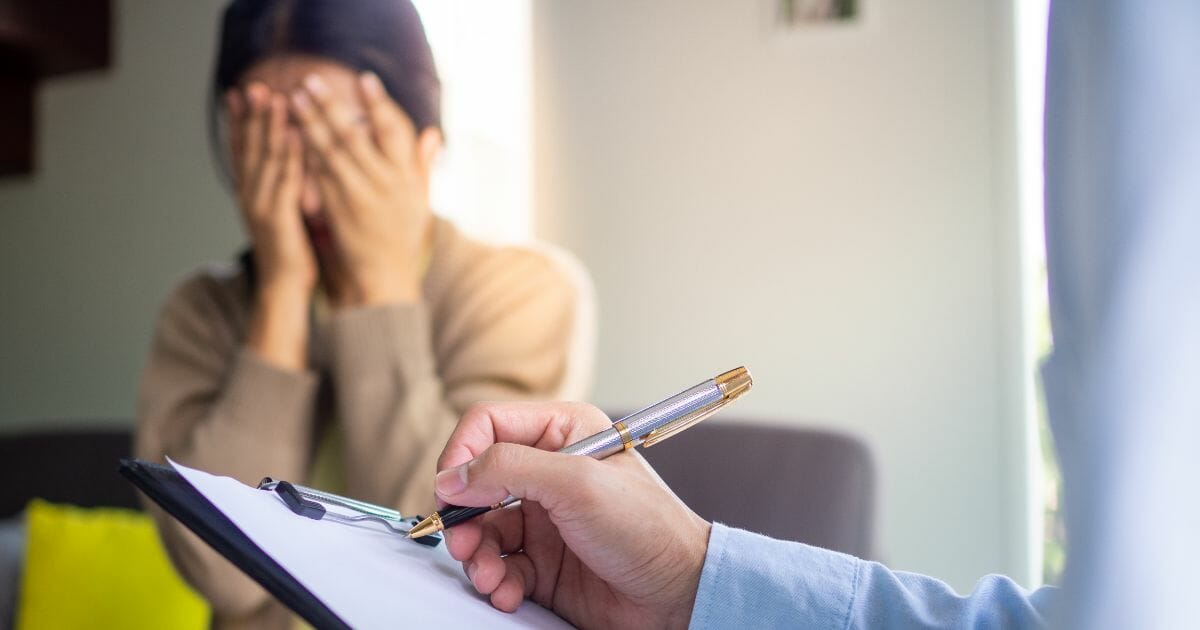How Long Depression Lasts – A Realistic Guide

Have you ever wondered how long depression lasts? Is this condition chronic and permanent or can you ever truly overcome it for good?
These are pretty common questions among those who feel depressed during difficult times and especially for those who have been diagnosed with this challenging condition.
The effects of depression can greatly vary depending on the severity of the condition, the treatment plan you have, and different types of people.
This guide gives you a much more realistic idea of what to expect from this type of condition and the depressive episodes it might entail.
As an affiliate partner of various brands and sponsored content, we may earn commission on qualifying purchases. Disclaimer | Advertise With Us
Depressive Emotions vs. Depression Disorder

Everyone will experience depressive emotions at least once in their lives. It is pretty common to feel blue after a tough day or to feel very sad and emotional after an unpleasant experience like the loss of a loved one.
Depressive feelings come and go for most people. But those with depressive disorder can struggle a lot more because these episodes tend to be frequent and can have all sorts of additional symptoms.
When Is Someone Diagnosed With Depression?
For someone to be professionally diagnosed with depression, they will need to exhibit at least five depression symptoms. The affected patient will also experience these symptoms at least once a day for at least two weeks.
Here is a quick look at some of the most common signs of depression.
- Reduced interest in activities that used to be enjoyable
- Frequent unpleasant feelings like sadness, emptiness, hopelessness, and frequent crying
- Frequent mood swings or anger outbursts
- Irritability and easily frustrated over small things
- Disturbed sleep patterns
- Fatigue
- Changes in eating habits
- Reduced confidence and self-esteem
Different Forms of Depression
Depression can come in many different forms and even these different forms of depression will be experienced differently or can have different intensity levels for different individuals. Here is a quick look at some of the most common types of depression.
Major Depression
This type of depression is associated with depressed feelings most days of the week. You might also experience all sorts of symptoms like fatigue, low self-esteem, low self-worth, a loss of interest, thoughts of suicide, and others.
Persistent Depressive Disorder
This type of depression tends to last for 2 years or longer. This term includes two different forms of depression namely low-grade persistent depression and chronic major depression. With this type of depression, you can have low self-esteem, feelings of hopelessness, a lack of energy, and concentration problems.
Bipolar Disorder
Bipolar disorder is also referred to as a manic depression. People with this form of depression usually struggle with mood episodes. They can experience extreme heights where they feel excessively happy and energized and this happy episode can be followed by an extremely low mood where you might feel angry, out of control, and experience outbursts.
Seasonal Affective Disorder (SAD)
SAD disorder, also known as seasonal depression is a form of major depression and usually occurs during the colder winter months when there is less sunlight and when we tend to spend more time indoors.
Antidepressants and sitting in front of a special type of light box can help treat this type of disorder.
Here are some tips to help you manage seasonal depression.
Psychotic Depression
Psychotic depression sufferers have all the same symptoms of major depression but they can also experience additional psychotic symptoms like hallucinations, paranoia, and delusions. This form of depression is often treated with antidepressants as well as antipsychotic drugs.
Postpartum Depression
Postpartum depression or perinatal depression can start appearing a couple of weeks or months after childbirth. The baby blues can include symptoms like depressed mood swings, crying spells, anxiety, or difficulty feeling empathy or affection towards the infant. Postpartum depression symptoms can last a couple of weeks up to 12 months after the first symptoms start appearing. In rare cases, mothers may experience depressive emotions up to 3 years postpartum.
Premenstrual Dysphoric Disorder
PMDD is very similar to PMS syndrome. With this form of depression, you may experience symptoms like mood swings, sadness, and other unpleasant emotions like hopelessness, irritability, and anger.
This form of depression tends to clear up with the onset of menstruation.
Situational Depression
It is natural to feel depressed if something bad happens in your life. This short-term form of depression is often related to stress and usually occurs after experiencing a traumatic event. Situational depression tends to resolve when your situation changes and usually lasts less than two weeks.
Factors that Can Affect How Long Depression Lasts

Most people experience depression in episodes that tend to flare up and fade as they face different challenges and aspects of their lives. Even those with extreme depression who tend to feel sad and emotional in general might feel episodes of extreme sadness or aggravation when these conditions flare up.
The duration of these depressive episodes can vary. Some might only experience one or two episodes while others might experience constantly recurrent episodes. The duration of each episode can also vary greatly because so many factors can contribute to these episodes.
Here is a quick look at a couple of factors that can affect your ability to overcome depressive episodes.
The Severity of the Condition
Even perfectly healthy and happy people will experience depressive episodes in their life. Those with depression disorder usually tend to struggle more to overcome these episodes.
If you don’t have depression disorder then these emotional feelings can start to clear up after a few hours and always seem to disappear the moment your problem is solved or the moment you put something challenging behind you.
If you struggle with mild depression, the episodes can become quite intense at times but you might still find the power to keep going and push through these challenging days. Depressive episodes should start to subside after a couple of days or within a few weeks depending on the severity of the issue.
Those with severe depression might find it hard to get up out of bed and do anything after experiencing a huge emotional setback. These depressive episodes can linger for weeks or even months if you don’t work on self-care or seek professional help.
The Type of Depression You Have
Depression has quite a few different faces and all of these different versions of mental illness can be terribly dangerous. Even short spells of depression can cause a lot of devastation because so much can happen while you are busy battling these internal demons.
Some forms of depression can take a lot longer to overcome than others. Situational depression, for example, usually clears up when the situation changes. PMS depression tends to resolve with the onset of your period. Postnatal depression can take anything from a couple of weeks to 3 years to treat and overcome.
Major Depression, bipolar disorder, and other forms of depression can however be very difficult to overcome. In most cases, people with these types of conditions simply learn to live with the condition instead of attempting to completely overcome it.
Seasons
People with depression tend to suffer a lot more during the cold winter months compared to warmer sunny summer months. This can be because of low Vitamin D levels, an increase in illnesses or diseases like the common cold, because of weight gain that tends to be common during winter, or because so many physical activities are put on hold during the colder months.
A Family History of Depression
Major depression tends to be genetic and women are twice as likely to struggle with these conditions as men. If your parents suffer from major and persistent depression then you stand a 50% chance of inheriting these conditions. Major depression is more hereditary compared to mild depression.
It is also important to realize that everyone suffers from depression at some point. Short spells of depression are natural and usually aren’t genetic.
Those who obtain this form of mental illness disorder through genetics can struggle with extreme depressive spells and they are likely to keep struggling with these conditions for the rest of their lives.
Your Personality
Certain personality traits are much more prone to developing depression than others and also takes longer to deal with these depressive states.
Introverts, individuals who are self-conscious and empaths are much more prone to develop these conditions compared to extroverts or self-confident individuals.
Your personality can also play a role in the duration of depressive spells. Someone who is shy, socially awkward, or an introvert will try to avoid activities like exercise, going out, socializing, and trying new things and these are the very things that can help treat this challenging condition.
Other Mental Health Conditions
Other mental health conditions can also affect your ability to overcome depression. Conditions like anxiety, obsessive-compulsive disorder, anxiety disorder, and bipolar disorder come with their own series of issues and don’t just increase your chances of developing depression, it can also cause depressive moods to linger for longer or to re-appear more frequently.
Past Experiences and Trauma
Depression obtained from specific traumatic events can cause very powerful spells of depression. The more severe the trauma is, or the greater the emotional impact of the trauma, the more likely you are to develop major depression. Events like abuse, sexual abuse, neglect, or painful accidents can all leave behind very deep scars and some of these scars will never fully heal.
Your Support Structure
Depression is difficult to live with and very hard to overcome. A steady support group can make a huge difference in your recovery. But not everyone does have empathic family members or friends who could lend you support in times when you are depressed.
When you have a support group or have family and friends lending support, offering comfort, socializing with you, and encouraging you to get back up again, you might feel a lot better in significantly less time.
The Type of Treatment you Receive
There are lots of different treatments for depression that can be used for improving and overcoming depressive symptoms. Medication, talk therapy, acupuncture, self-help programs, journaling, exercise, diet therapy, and many other remedies can help treat depression so you can feel better sooner.
Stressful Living or Working Environments
Depression sufferers who live under constant stress or who have to work and live in an unpleasant environment can also struggle a lot more to overcome their condition.
The constant stressful life events along with regular unpleasantness in the form of family disputes, disputes with managers or colleagues, or other types of stress can make it very difficult to make time for self-care. Consistent exposure and reminders of negative factors also make it very difficult to feel confident and happy.
Financial or Health Issues
They say money can’t buy happiness, but money can help afford medical treatments or therapies that are often needed to combat and overcome these conditions.
Being stuck at home all the time due to financial restrictions or because of medical problems can also make someone feel quite depressed and can have a huge impact on feelings of self-worth.
People with a lot of debt and health issues are also constantly under a lot of stress and strain. Stress itself can have an impact on your immune system and stress is a pretty big trigger for depression and unpleasant outbursts of anger and rage.
Final Thoughts
How long depression lasts can depend on various factors. Depressive emotions or occasional depression usually tend to clear up within a day and can keep recurring for up to a week.
However, someone who experiences repetitive symptoms of depression for longer than two weeks should book an appointment with a psychiatrist because this is a clear sign of depression disorder and it can take several months to clear up. In severe cases, depression can last for years or it can become a chronic condition that needs to be treated permanently.
If you are looking for great ways to feel happier or deal with your depression then you should have a look at some of the other guides we have on Well and Wealthy. We hope that this and some of our other guides are helpful for understanding this complex condition and that they will guide you toward remedies that can improve your quality of life.
As always, it is much better to speak to a professional healthcare provider so you can get professional help and guidance.








